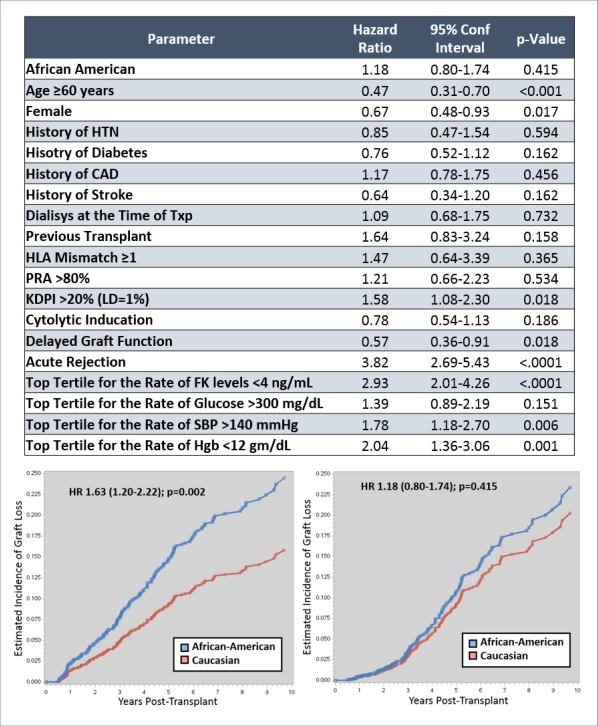Impact of Aberrant Post-Transplant Laboratory and Blood Pressure Values on Graft Survival and Racial Disparities in Kidney Transplant
MUSC, Charleston, SC.
Meeting: 2018 American Transplant Congress
Abstract number: D73
Keywords: African-American, FK506, Graft survival, Kidney transplantation
Session Information
Session Name: Poster Session D: Kidney Complications: Late Graft Failure
Session Type: Poster Session
Date: Tuesday, June 5, 2018
Session Time: 6:00pm-7:00pm
 Presentation Time: 6:00pm-7:00pm
Presentation Time: 6:00pm-7:00pm
Location: Hall 4EF
Objective: The aim of this study was to assess the impact of post-transplant lab and blood pressure (BP) clinical data on graft survival and racial disparities in kidney transplant (KTX).
Methods: Longitudinal cohort study of adult solitary KTX between 2007 and 2016. Pediatrics, repeat KTX, non-renal transplants and follow-up <6 mos were excluded. Multivariable competing risk Cox regression modelling was used to assess the impact of baseline and post-transplant variables on graft survival and disparities in AAs. We estimated rates of aberrant values post-transplant, including systolic BP (SBPs), tacrolimus (FK) levels, glucose, magnesium (Mg), potassium (K), hemoglobin (Hgb), white blood cell (WBC) counts, and acute kidney injury (AKI) events. High rates were based on the top tertile of patients.
Results: 1,934 KTX occurred during the study time period, 1,469 met criteria and were included; there were >611,000 labs and >208,000 SBPs assessed. In univariate analyses, 4 variables were significantly associated with graft survival and racial disparities: high rates of FK levels <4 ng/mL (HR 5.18 [3.81-7.05), SBPs >140 mmHg (HR 4.44 [3.32-5.94]), Hgb <12 gm/dL (HR 5.00 [3.76-6.63]) and glucose >300 mg/dL (HR 3.27 [2.29-4.67]). The fully adjusted model including baseline sociodemographics, rejection, DGF and these 4 variables had strong discriminatory power (AUC 0.858, Table 1). In the unadjusted model, AA race was associated with a 63% higher risk of graft loss (HR 1.63 [1.20-2.22], figure bottom right). In the fully adjusted model, the risk in AAs for graft loss was attenuated by 45% (HR 1.18 [0.80-1.74], Figure bottom right).
Conclusion: High rates of aberrant FK levels, SBPs, Hgb and glucose levels are strongly associated with graft loss and explain a substantial component of the higher risks associated with AA recipients. Efforts to improve on FK dosing, hypertension control, anemia and diabetes management may significantly mitigate racial disparities for AA KTX recipients.
CITATION INFORMATION: Taber D., Su Z., Fleming J., Pilch N., Posadas A., Rao V., Mauldin P., Dubay D. Impact of Aberrant Post-Transplant Laboratory and Blood Pressure Values on Graft Survival and Racial Disparities in Kidney Transplant Am J Transplant. 2017;17 (suppl 3).
To cite this abstract in AMA style:
Taber D, Su Z, Fleming J, Pilch N, Posadas A, Rao V, Mauldin P, Dubay D. Impact of Aberrant Post-Transplant Laboratory and Blood Pressure Values on Graft Survival and Racial Disparities in Kidney Transplant [abstract]. https://atcmeetingabstracts.com/abstract/impact-of-aberrant-post-transplant-laboratory-and-blood-pressure-values-on-graft-survival-and-racial-disparities-in-kidney-transplant/. Accessed February 19, 2026.« Back to 2018 American Transplant Congress

